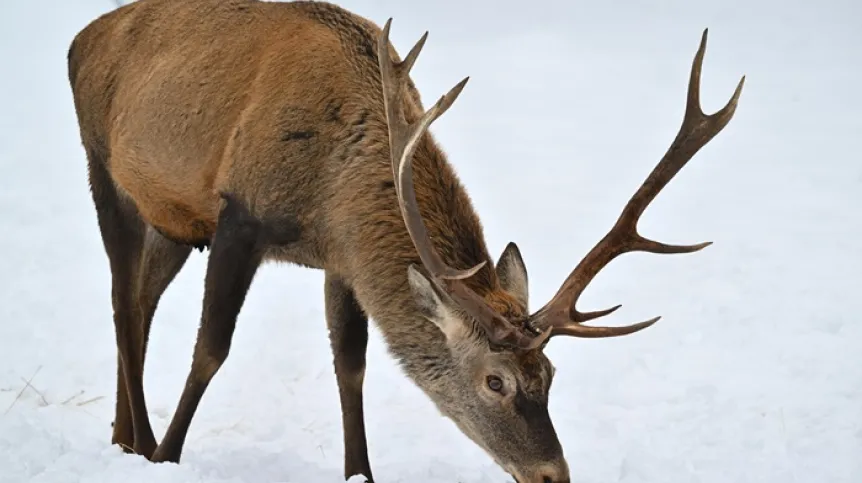
Scientists from Germany, Italy and the Mammal Research Institute of the Polish Academy of Sciences in Białowieża checked whether large predators still mattered in ecosystems heavily dominated by humans. Human activity, such as hunting, may affect ungulate populations more than the presence of predators, they say.
By hunting, large predators can reduce the density of ungulates. This common-sense thesis has already been confirmed in studies of vast ecosystems, relatively unchanged by humans.
In a new publication in the Journal of Applied Ecology, the scientists from Germany, Italy and Poland consider whether large predators still fulfil their ecological tasks in ecosystems that are heavily dominated by humans.
Their research covered almost 500 selected areas in 28 European countries. Scientists checked how the presence of large predators (wolves, lynxes and bears in various configurations) affected the density of deer. They also checked whether there was any human interference in the studied areas.
As it turns out, the density of deer decreased due to predators only when wolves, lynxes and bears were present in a given area at the same time. The occurrence of one of these species does not have much significance for the density of the deer population.
However, when it comes to the impact of humans on the density of deer - the effect is very strong, e.g. in the case of hunting, which has a clearly negative impact on the density of deer. This effect was stronger than the effect of the presence of all large predators. They, in turn, have the greatest impact on the environment where the pressure from people is relatively smallest.
The authors of the study suggest that if people want to 'give a voice' to natural regulatory mechanisms - for example, lead to a situation in which large predators would regulate the population of ungulates - our own human impact on ecosystems should be limited.
'This applies to the entire society - although it is known that there are different opinions about the presence of large predators in Europe,’ Dr. Dries Kuijper from the Mammal Research Institute PAS tells PAP - Science in Poland. He reminds that large predators, especially wolves, are returning to the landscape of Europe 'and can adapt to life even in densely populated areas, such as the Netherlands or Germany.’

'In the study, we conclude that it is good to realize that the value of wolves returning to Europe can be seen especially in those parts of the continent that we - humans - have not fully regulated. In areas where there is no hunting, we can observe how large predators do their job and support natural processes. In my opinion, this is something very valuable, because hunters cannot replace the ecological consequences of the presence of predators,’ says Kuijper.
The scientist also comments on the viability of regulating the size of the ungulate population by humans. 'Yes, people can regulate the number of deer. And no, they will not affect their spatial behaviour and behavioural changes resulting from the presence of wolves. We have lost the influence of these large predators in recent centuries in Europe. Now there is a chance to regain it. In my opinion, we should recognize the value of wolves returning to our landscapes. We should take a step back and leave matters to nature,’ Kuijper says.
When asked whether the research conclusions can be used in practice, the scientists mentions two messages derived from them and their importance for nature management and conservation.
'First of all, we shouldn't worry too much about large predators' impact on ungulates,’ he says. 'We often hear that when wolves return to a given area, nothing is left for hunters who, wanting to hunt deer, see large predators as competition. Our study shows that the presence of wolves (or other large predators) is not consistently associated with a marked reduction in deer density. In some cases they may reduce deer numbers, but - looking at Europe as a whole - they have a more subtle effect on their populations. In short: large predators are not serious competition for hunters.
'Secondly, the impact of large predators on prey species is strongest in parts of Europe least modified by humans. In most areas of Europe, hunting is the main factor that determines deer density. It is surprising how few hunting-free areas remain in Europe.’
Dr. Kuijper recalls the study conducted by Susan Van Beeck Calkoen and colleagues in 2020. It shows that even in the most protected areas of Europe (national parks), hunting of ungulates is a popular population management practice (68% of all national parks conduct it).
'This, of course, is very strange. The purpose of national parks is to protect natural processes, but by hunting - we somehow prevent them. Especially now, when large predators - especially wolves - are returning to the European landscape, we can resort to more natural ways of regulating the number of deer. This means that we should try to ensure that large predators can perform their tasks, which hunters have been opposed to for centuries', he says, adding: 'Moreover, large predators have a greater impact on their prey from the group of ungulates. In addition to regulating the density, they also have a significant impact on the behaviour of ungulates. These are very valuable consequences of the presence of large predators returning to the European landscape, and it is worth stimulating them. This is a very important factor in promoting natural processes and biodiversity.’
PAP - Science in Poland, Anna Ślązak
zan/ bar/ kap/
tr. RL













